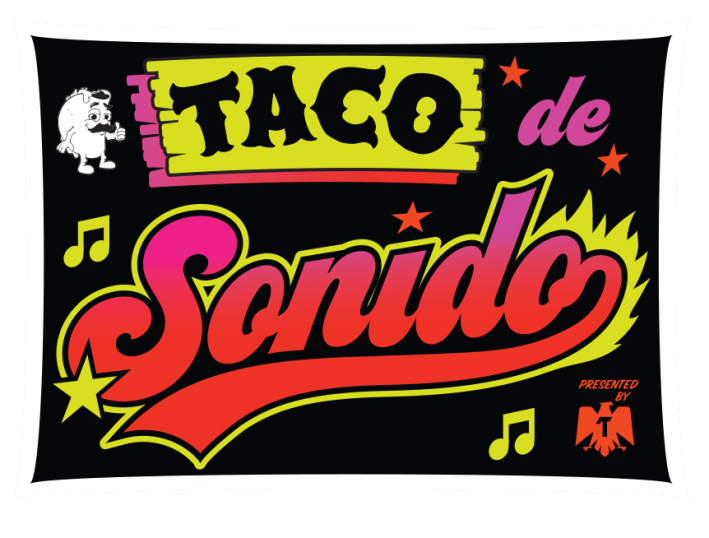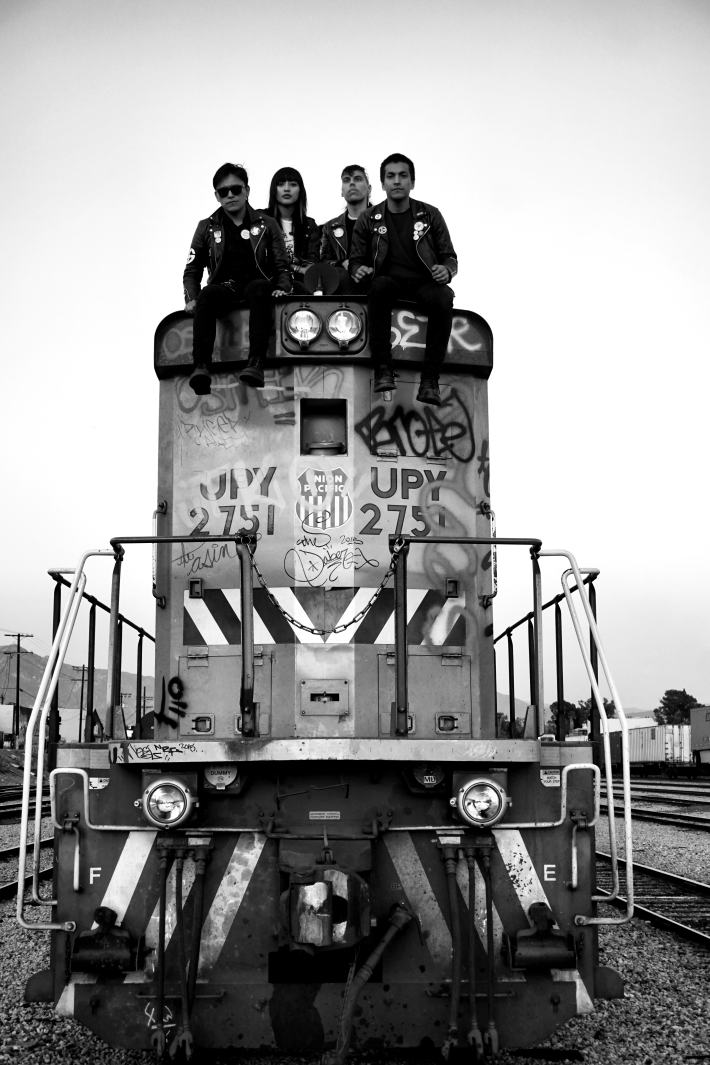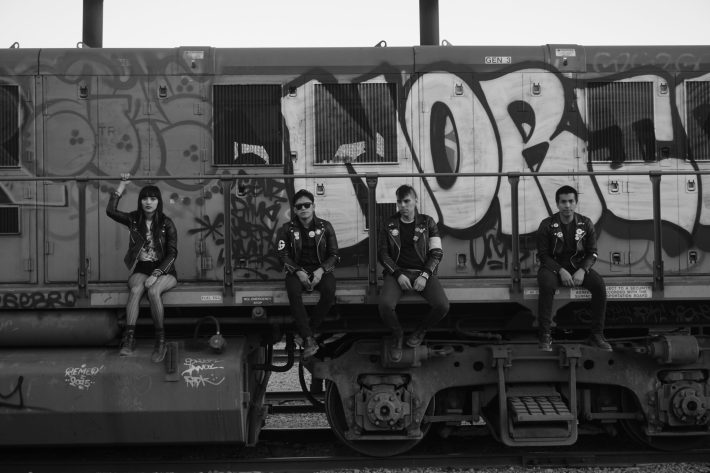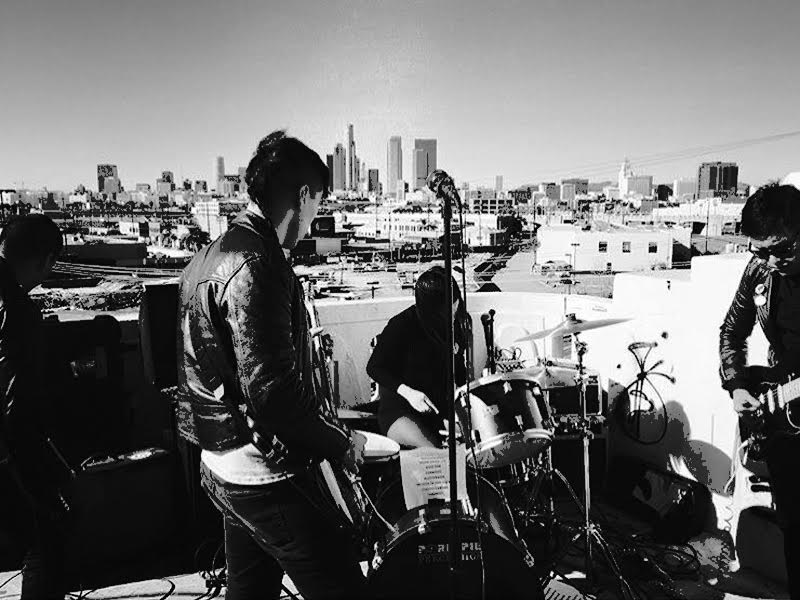
Welcome to Taco de Sonido, our new monthly music column presented by Tecate, the official beer of L.A. TACO. Each month we'll bring you the latest up-and-coming artists that are staking a claim to the new sound of Los Ángeles. Read, listen, share, and don't be afraid to share your comments or suggestions for new artists for us to check out. We've got our ears on the street but we want to hear from YOU.
[dropcap size=big]I[/dropcap]n Español, Tony Abarca, and 'Kiwi' Martinez have created their true L.A. punk rock genre, along with a world all their own. Hailing proudly from South Central Los Angeles, the pair and their bandmates guitarist Mario Quezada and bassist Elias Jacobo make up perhaps the best punk band to come out of Sur Califas in the last decade, Generación Suicida.
“It wasn’t really anything tied to a movement or a reason,” when Abarca describes their humble beginnings—inspired by the sounds of Basque punk rock heroes Eskorbuto along with The Cure that they would hear on burned CDs and heard in friends’ bedrooms. Wanting a creative outlet of their own, Abarca began writing guitar riffs, while Martinez would follow along on the drums, laying the groundwork for her own fast-paced drumming style. “I utilized it as a way to express myself. A lot of it came from anger at the beginning, and that felt good. I love playing fast. It’s like freedom,” Martinez says when explaining. They knew they wanted to craft a more melodic and stripped-down sound of their own from those early sessions.

Singing the entirety of their catalog in Spanish, sung by Abarca on lead vocals, GS manages to create an approach that’s distinctly all their own. “My voice in English doesn’t sound as cool,” Abarca explains. Even deciding to take it one step further, even with creating their own spelling for specific words, opting to use the letter ‘k’ instead of the letter ‘q’ in their songwriting because of the way it sounds, specifically the hardness of the ‘k’ sound. “We tend to like things that are unpolished, raw, and real. We don't use "proper" Spanish. All our lives, the teachers at school would tell us that our Spanish wasn't "real" Spanish and spoke it wrong. Doesn't seem wrong at all to us,” Abarca states proudly.
“It's like we have our own dialectic here in the hood,” Abarca says. We use sayings in our songs in Spanish that don’t exist in Spanish. “We wanted to play the music that people from the ‘hood could understand.” Capturing the essence of a community of recent immigrants who call the hood of South Central home and feel proud of where they come from. Hence the group’s decision to use the tagline, “musica del barrio para el barrio.”
“We want to have that representation. It’s oftentimes kids growing up in South Central are told they won’t amount to anything, other than dead or in jail. Often getting typecast as being from East L.A. because they are Latino. East L.A. is cool, and I like it, but we are representing where we are coming from. “Our story is a bit different.”
Upon first listen of the opening track of their 2019 release, Reflejos, it’s quick to see how GS effortlessly traverses a series of sonic landscapes, walking—sometimes breaking into a sprint—a tight line that embodies both the aggressive nerve as well as the serene. The opening track Unidos, with its angular-sounding guitar parts paired with Abarca’s vocal delivery that cuts through like a buzz-saw to the face, followed by Nadie Se Escapa de Aki, which features a glistening guitar part that builds like a symphonic dream of lights.
“When you go to one of our live shows, and you can feel that emotional burst,'' Abarca says. Martinez expresses something similar that is felt when she’s on stage drumming. The oldest of four in a traditional Guatemalan household, she uses her musical output as a release from the trappings of the patriarchy. “I had a lot of responsibility growing up and wasn’t allowed to voice my opinion,” recalls Martinez.

Being a woman in the punk rock scene and the only female member of her band can be a complex space to navigate. “I feel very fortunate to be able to travel and make a lot of friends who are doing the same thing,” Martinez says. However, she’s quick to point out that most of the bands they tour with are men. Beyond that, Martinez mentions as a musician; she often finds herself the subject of dialogue filled with micro-aggressions from male audience members. It’s not uncommon for her to deal with occurrences such as men commenting on the way she holds her drum sticks or even hearing things like, “People just like your band because you’re a girl and you’re pretty.”
“It can re-traumatizing. These men can make you feel so little. It makes you question yourself,” says Martinez.
It’s that struggle that Martinez has felt, paired with the homegrown fighting spirit, that has allowed her to develop her confidence. Kiwi believes by overcoming these difficulties; it can serve as a model for women. “Women will come up to me after shows. I feel like I am passing along some fire to them. If you’re a woman, even if you’re not in a band, you’re going to face these assholes.”
“I feel like we have a lot of different elements and influences in our band, but it’s still GS. I think we would get bored releasing the same record over and over again.”
These days, the bands have turned their attention to their next record, which finds GS taking steps towards evolving as a band. Regeneración, their fifth LP, in their decade-plus career as a band which they hope to release in the late summer early fall of 2021.
Mixing their melodic punk style with other newly founded elements such as funk and post-punk to round out their overall sound. Having come all this way as a band, they know that they might have lost some of the original listeners since they aren’t adhering to the traditional binaries of punk rock that they once did on their earlier records. “At this point, we don’t even care if it sounds like punk,” Abarca says. “I feel like we have a lot of different elements and influences in our band, but it’s still GS. I think we would get bored releasing the same record over and over again.”
Throughout their career, the band has played in Latin America, Europe, Asia, and Australia...that is in the before times. The band hopes the release of their upcoming record will coincide with the reopening of live music venues. It’s been a rough road for a group whose live performances are central to their identity as a band just as much as being from South Central.
“We want to have that representation. It’s oftentimes kids growing up in South Central are told they won’t amount to anything, other than dead or in jail. Often getting typecast as being from East L.A. because they are Latino. East L.A. is cool, and I like it, but we are representing where we are coming from.”
“Our story is a bit different.”
“Everything is connected, your sound and your environment. Your environment reflects in how you play. You want to feel proud of where you're from, and other people feel proud of where they’re from.”






